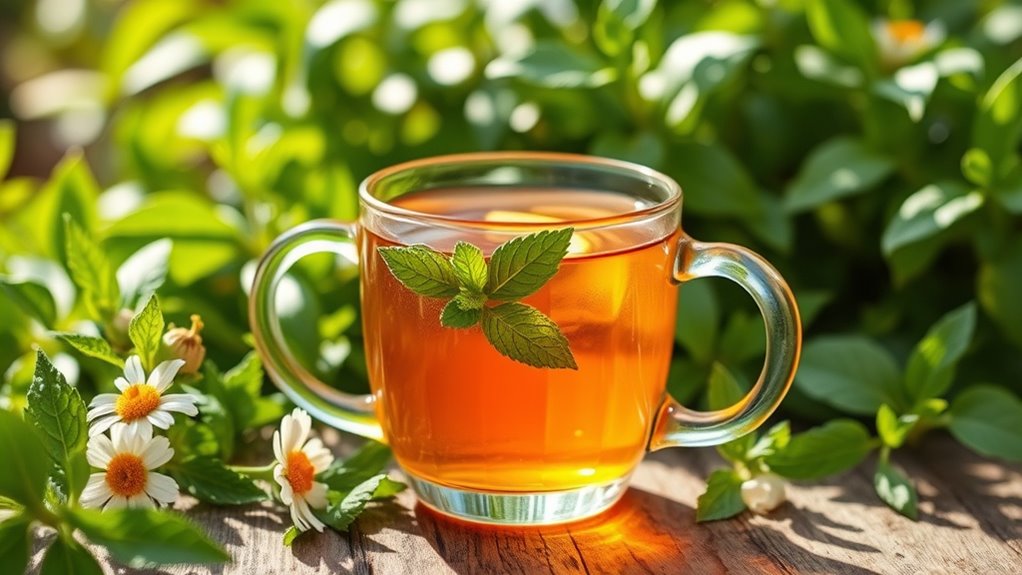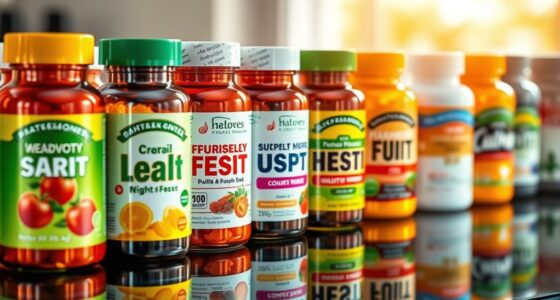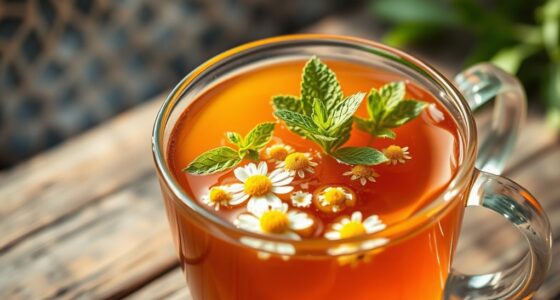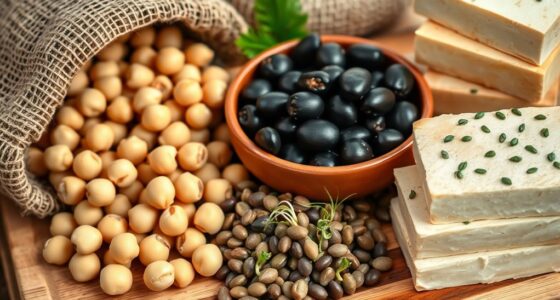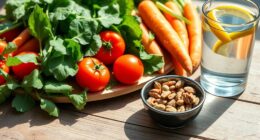Herbal teas offer more than just soothing flavors—they’re packed with antioxidants that protect your cells from damage, reduce inflammation, and boost overall wellness. Different blends support immunity, aid digestion, and promote relaxation without caffeine. Plus, they keep you hydrated and turn your daily routine into a healthful ritual. Many herbs, like ginger and hibiscus, provide specific benefits you may not realize. For a deeper look into these surprising perks, keep exploring how herbal teas can transform your health.
Key Takeaways
- Herbal teas are rich in antioxidants that protect cells and combat free radicals, promoting overall health.
- They support digestion, reduce inflammation, and enhance immune function through various herbal ingredients.
- Consuming herbal teas can improve skin health, cardiovascular wellness, and mental clarity naturally.
- They are caffeine-free, making them a healthy, relaxing alternative to sugary or caffeinated drinks.
- Herbal teas can be enjoyed hot or cold, offering versatile, delicious hydration that boosts wellness anytime.
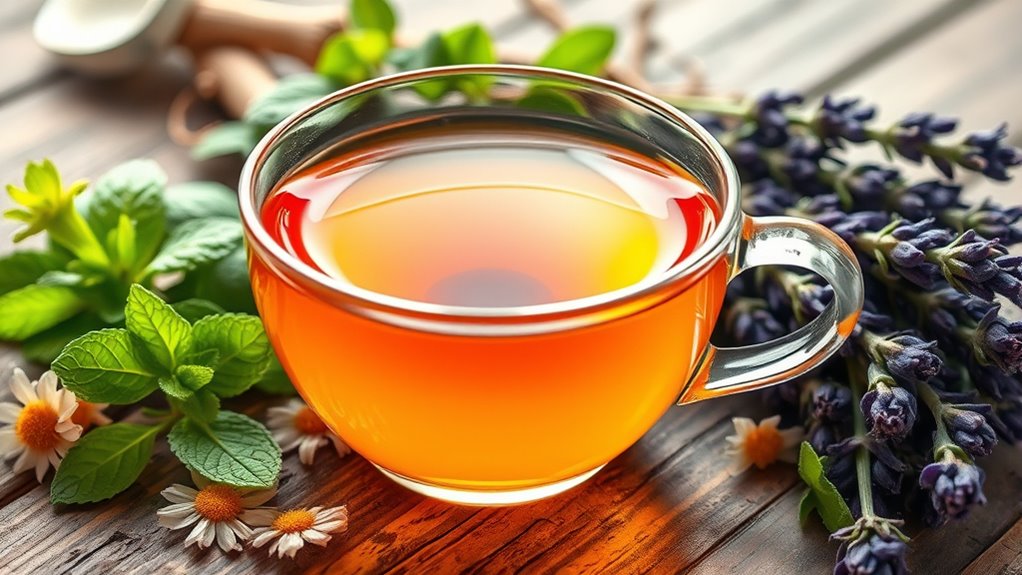
Herbal teas have gained popularity not just for their soothing flavors but also for their numerous health benefits. When you sip on these aromatic infusions, you’re not only enjoying a comforting beverage but also tapping into a rich source of tea antioxidants. These natural compounds help protect your cells from oxidative stress, which is linked to aging and various chronic diseases. Unlike traditional teas derived from Camellia sinensis, herbal blends often contain a diverse array of plants, each offering unique health perks. By choosing different herbal blends, you can target specific wellness goals, whether it’s boosting immunity, improving digestion, or promoting relaxation.
Herbal teas provide antioxidants and health benefits beyond traditional tea varieties.
The beauty of herbal teas lies in their variety. You might find yourself drawn to chamomile for its calming effects, peppermint for digestion, or hibiscus for its vibrant flavor and blood pressure benefits. Each herbal blend is carefully crafted, combining plants that complement each other’s flavors and health properties. When you drink these teas regularly, you’re not only indulging your taste buds but also enriching your body with essential nutrients. Many herbs used in these blends are rich in antioxidants, which combat free radicals and reduce inflammation. This can lead to improved skin health, better cardiovascular function, and even enhanced mental clarity.
Moreover, herbal teas are an excellent alternative to sugary drinks and caffeine-laden beverages. They offer a naturally sweet or subtly bitter taste, depending on the herbs used, and can be enjoyed hot or cold. As you explore different herbal blends, you’ll notice how versatile they are—perfect for any time of day. For example, a warm cup in the evening can help you unwind, while a cold herbal infusion can refresh you during hot afternoons. Since herbal teas are generally caffeine-free, they won’t interfere with your sleep or cause jitters, making them an ideal choice for maintaining hydration and relaxation.
In addition to their antioxidant content, many herbs in these blends have specific health functions. Ginger, for instance, can help reduce inflammation and nausea, while lemongrass may support digestion and detoxification. Incorporating a variety of herbal teas also allows you to benefit from the diverse plants used in these blends, each contributing different nutrients and wellness effects. By incorporating a variety of herbal teas into your routine, you’re giving your body a broad spectrum of plant-based compounds that promote overall wellness. So, next time you’re looking for a healthful drink, reach for an herbal blend. It’s a simple, delicious way to boost your antioxidant intake, enjoy a calming ritual, and support your body’s natural defenses—all in one soothing cup.
Frequently Asked Questions
Can Herbal Teas Replace Your Daily Water Intake?
While herbal teas are flavorful and can boost your hydration levels, they shouldn’t fully replace your daily water intake. Drinking herbal teas adds flavor variety and provides some hydration benefits, but water remains essential for ideal body function. To maintain proper hydration, enjoy herbal teas alongside plain water, especially since they contain caffeine or other ingredients that might have diuretic effects if consumed excessively.
Are Herbal Teas Safe During Pregnancy and Breastfeeding?
You might worry about herbal tea safety during pregnancy and breastfeeding, but not all herbal teas pose risks. While some herbs can have pregnancy herbal risks, many are safe when consumed in moderation. Always check for pregnancy herbal risks and consult your healthcare provider before drinking herbal teas, especially if you’re breastfeeding. This way, you enjoy the benefits without risking your health or your baby’s safety.
How Do Herbal Teas Affect Medication Effectiveness?
Herbal tea interactions can impact medication effectiveness by affecting absorption or metabolism. You should be cautious, as certain herbs may interfere with how your body processes drugs, potentially reducing their effectiveness or causing side effects. Always check with your healthcare provider before drinking herbal teas if you’re on medication. Understanding these medication absorption effects helps you enjoy herbal teas safely without compromising your treatment.
Which Herbal Teas Are Best for Boosting Immunity?
You want to boost your immunity, so look for herbal blends known as immune boosters. Teas with ingredients like echinacea, ginger, turmeric, and elderberry can strengthen your immune system naturally. These herbal teas work by reducing inflammation and fighting off infections. Drinking them regularly can help you stay healthier and more resilient against common illnesses. Just make sure to choose high-quality blends and enjoy their benefits as part of your wellness routine.
Are There Any Herbal Teas Suitable for Children?
Think of children’s herbal tea safety as a gentle bridge for little explorers. Some herbal tea varieties, like chamomile or ginger, are generally suitable for kids, but you should always check with a healthcare professional first. Not all herbal teas are safe for children, so avoid those with strong or unknown ingredients. By choosing carefully, you can introduce soothing, natural flavors that support their well-being without worry.
Conclusion
So, next time you brew a cup of herbal tea, remember it’s more than just a soothing beverage—it’s a secret potion for your health. From calming your mind to boosting your immune system, these teas pack a punch without the need for a wizard’s spell. Don’t wait for a fairy godmother to grant your wish for wellness; sip on herbal teas and embrace their surprising powers today. Cheers to a healthier, happier you!
